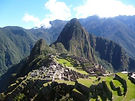PERU INFO
Home > About Peru > Culture > Literature
About Peru
Peruvian literature
Apu Ollantay
Work in Quechua (language of the Incas), is a drama that chronicles the forbidden love between Ollanta, a general of the Inca army, and Princess Cusi Coyllur, daughter of the Inca Pachacutec, who only could marry an Inca. The general took refuge in a village in the Sacred Valley which now bears his name: Ollantaytambo.
Inca Garcilaso de la Vega (1539 / 1616)
He was a mestizo chronicler and writer (his Christian name was Gómez Suárez de Figueroa), son of Spanish Captain and conquistador Sebastián Garcilaso de la Vega and Inca princess Isabel Chimpu Occlo. Born in Cuzco in 1539, died in Cordoba, Spain in 1616.
His major work was "The Royal Commentaries of Peru" (Comentarios Reales) which tells about Inca life and traditions.
Ricardo Palma (1833 / 1919)
Writer and journalist, his magnum opus in 11 volumes "Peruvian Traditions" (Tradiciones peruanas), short stories relating the customs of colonial Lima in the early decades of the republic, with stories about the liberators and the war of independence.
Abraham Valdelomar (1888 / 1919)
Narrator, poet, journalist, essayist and dramatist, he is considered one of the major Peruvian storytellers. Its best works: Gentleman Carmelo (El Caballero Carmelo), Our Children of the Sun (los Hijos del Sol), the flight of the condors (el Vuelo de los condores), etc.
Ciro Alegría (1909 / 1967)
Novelist and politician (deputy in 1963), he exposed the problems of the native Peruvians, defending the oppression of Andean Indians, denouncing injustice and misery. His most well known novel is: Broad and Alien is the World (El Mundo es Ancho y Ajeno).
Julio Ramón Ribeyro (1929 / 1994)
Another great Peruvian writer, best known for its short stories, his works have been translated into numerous languages, such as Featherless Buzzards (Los Gallinazos sin Plumas), Silvio in the rose garden (Silvio en el Rosedal), etc.
Alfredo Bryce Echenique (né en 1939)
Graduate in Peru and France, professor in different countries universities (France, USA, etc.), has written numerous novels as: a World for Julius (un Mundo para Julius) award for best foreign novel in France, Tarzan's Tonsillitis (la Amigdalitis de Tarzán) Grinzane Cavour Prize in Italy, The Garden of my Beloved (El Huerto de mi Amada) winner 2002 of the Planet Award and stories book as Huerto cerrado, A Sad Tour of Paris (Guía Triste de Paris), etc.
Mario Vargas Llosa
Nobel Prize in Literature 2010
Born in 1936 in Arequipa (southern Peru), is one of the most important Latin American novelist and essayist. He also ran for the presidency of Peru in 1990, defeated by Alberto Fujimori.
He has received numerous awards and distinctions, Prince of Asturias Award for Literature (1986), Cervantes Prize (1994), he is a member of the Royal Spanish Academy, has doctorates at universities such as Yale, Harvard, Europea de Madrid, La Sorbonne and was awarded the "légion d'honneur" by French government.
Some of his works:
The Time of the Hero (La ciudad y los perros), a novel that tells its own experience in a military school, won the Prize of the Spanish Critica in 1965.
The Green House (La Casa Verde)
Conversation in the Cathedral (Conversación en la Catedral)
Aunt Julia and the Scriptwriter (La Tía Julia y el Escribidor)
The War of the End of the World (La Guerra del Fin del Mundo)
Sergio Bambarén
Born in 1960 in Lima, is the Peruvian writer more published worldwide. His first novel, "The Dolphin, Story of a Dreamer" has been translated into more than 40 languages and sold over 10 million copies, adapted into an animated 3D movie.
César Vallejo (1892 / 1938)
Born in Santiago de Chuco (near Trujillo, northern Peru) in 1892 and died in Paris in 1938, he was a poet, novelist and journalist, considered among the greatest poetic innovators of the 20th century. Vallejo spanned several literary genres, lyrical, narrative, dramatic and essayistic.
Some of his works:
Poetry - The Black Messengers (Los Heraldos Negros), Trilce, Selected Poems and Human Poems.
Novels - Escalas melografiadas, Wild Language, tungsten, Paco Yunque.
Essays - Reflections on foot of the Kremlin, against secrecy, art and revolution.
Peru




